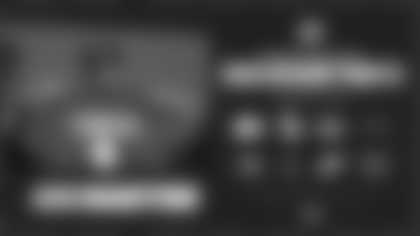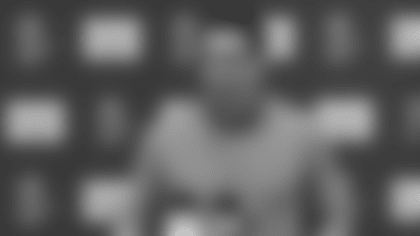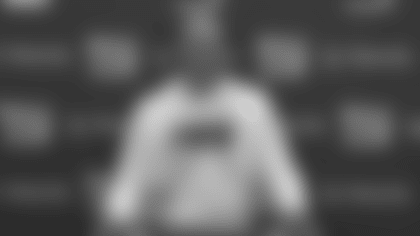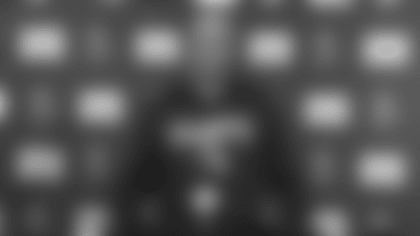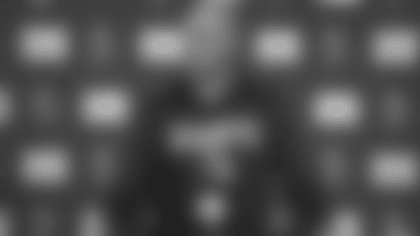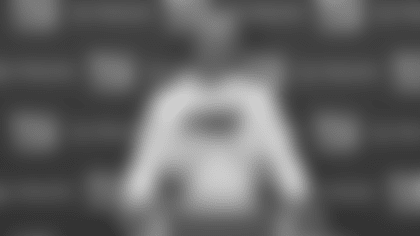Head Coach Brian Daboll
Q: Obviously it was only day one, but what did you see from Jaxson?
Brian Daboll: Day one. Operated fine did a good job. See if we can build on a little bit today.
Q: Are you seeing a little bit more with each class you've gotten acclimated to? Have you seen the adjustment to them up to getting up to speed in terms of being ready to go right now as the focus of the year is still just the same thing.
Brian Daboll: Yeah, same thing for these young players. Again, a lot of information, not just the football side of it, all the other things that go into moving and being in a new place at a young age. There's a lot of work that goes into it. There are a lot of meetings, there's a lot of mess ups and mistakes and you just correct them and then you see if the guys can take the teaching and instruction and improve on it the next day and that's just trying to build it each day with these guys. Usually for most young players it just doesn't happen like that.
Q: You seem to be in a really good spirit yesterday. You move around; you have a smile on your face. You were kind of throwing a couple of jabs at people. Do you just attribute that to being back on the field and kind of back into that element, getting that feeling back?
Brian Daboll: What's the alternative? What do I usually do? I am just messing around. No. Yeah. You enjoy being out there on the field, I like the guys we get the opportunity to work with, but it's always good to get back on the field rather than be in the office.
Q: Probably worked with a lot of young guys throughout your career, Brian, I mean of course we've seen little jittery back there or wide eye. Jaxson did seem comfortable. Was that something that you picked up on that seemed kind at ease back there even on day one?
Brian Daboll: Yeah, I mean there's nobody rushing him. He did what he was supposed to do. He was prepared. He put a lot of time and effort into it. I got a lot of appreciation for how he's gone about short amount of time his business, and that's what's most important is how we can get him to a routine meeting with players extra, having walkthroughs at the hotels, communication, that's part of playing quarterback is being on top of all those little things and if he can't be on top of him, then the other guys, if they don't know him, he can't direct him in the right direction. In terms of where he threw the ball and I mean we're not running any exotic coverage or having a pass rush or pressure, so there'll be time to develop that. But what we've asked him to do and how he's gone about his business as a young pro at that position is important.
Q: As you saw it or you've heard or you found out about it when he was meeting extra with some of his teammates, what goes through your mind when you see a young guy doing that?
Brian Daboll: Yeah, that's what he should do. Quarterback.
Q: I imagine though not everyone does.
Brian Daboll: Good ones do. Yeah, it's a good one. I mean it doesn't guarantee you that, but that's part of being a quarterback, part of being a leader, making sure that you're on top of your stuff. But in order to be an effective quarterback, you have to have all the other guys around you on top of their stuff and at this early part of the stage, you might get a receiver going, hey, what do I got? What do I got? And if he can't answer that question, then he's not really doing his full job. He needs to know everybody's responsibility playing quarterback.
Q: Did he have to be told that Jackson or did he just do that?
Brian Daboll: Yeah, I think he's got some natural leadership qualities. Look, we communicate. We're trying to teach as much as we can, not just plays, but a lot of other things that we believe are important for a young quarterback. We'll continue to do that. He's got the right traits for it.
Q: We saw Kafka with the walkie-talkie yesterday. Have you made a decision on
Brian Daboll: Good Observation.
Q: Abdul talked about you guys are trying to help him become a leader too. What are you trying to see from him? Maybe kind of take that they don't stay one, but just what do you see from him challenging him in that way?
Brian Daboll: Same thing. Look, these two guys were high picks, so they'll have some responsibilities not just knowing when to drop or when to rush or who to throw it to, but leadership things that will ask them to do in terms of the group, again, they have such a long way to go. I know we had a big press conference yesterday, the first day. There's not much that's changed from day one to day two.
Q: When you started in this, there were 11-on-11 elevens. There was a lot of stuff, a lot longer practice, now when you look back at that, we could have asked you a hundred questions about that back then. It looked like a real camp.
Brian Daboll: Some people don't even do rookie camps right now.
Q: Nothing?
Brian Daboll: I mean the biggest thing I noticed is the nice bags they got from NIL. They didn't have those nice bags before. There's a lot of nice bags in the indoor right there.
Q: It's probably a lot of nice cars in the parking lot. They didn't have
Brian Daboll: Taking a bus right now.
Q: But you got a lot out of that as a coach back then. I mean do you look and say, well we can't get that out of
Brian Daboll: I'd say again, Paul, the biggest thing that you usually try to get out of a rookie camp, at least where I've been and I've worked for is kind get to know them. You don't have pads on, you're not playing football. There's a lot of things. There's anxiousness, there's so much information that you're trying to give them, they're trying to retain. Again, it's very, very introductory, so I wouldn't say that much has changed relative. Nobody's making the team or anything like that. Kind of just starting at the beginning of the alphabet here.
Q: Coach, just building off Paul's question, it's still weird for me looking at this roster, the rookie C minicamp and seeing 24- and 25-year-olds. Do you see a difference between the age group that you used to deal with when you first got into where we are now or nothing really changed?
Brian Daboll: Not too much. I mean, again, they got a bit more money in their pocket from how college football is nowadays, but they're all coming to a new spot. They're all meeting new people; they're getting coached different techniques. They're learning new playbooks. They're learning where things are in a city. I mean there's a lot, as you know, those of you who have children their age, which I do have a bunch of them, a lot of things that are going on in their lives when they're young 20 year olds. The times they change, you try to acclimate the best you can to help them and where they're at, but make sure they keep their feet grounded where they're at and do the right thing.
Q: You mentioned Brian, that the NIL deals money in pockets, the bags. Has that helped at all with the evaluation of kids where maybe a variable of how are they going to handle their first NFL paycheck? You don't have to think about that anymore.
Brian Daboll: That's a great question. I don't think I have a great response for you. I know back in the day you'd ask them, hey, what are you going to get with your first contract? Well, most of them have had that already, so whether they got a louis bag or a nice pair of Jordan's, whatever it may be. That's a good question.
Q: We saw Cam Skattebo behind the plays kind of mirroring everything yesterday. Was that something that he just kind of did on his own? Did somebody talk to him about it or is that just him being anxious and wanting to be out there and since he can't, he's going to do whatever he needs?
Brian Daboll: No, look, you try to steal as many reps as you can as a player, particularly to a new system. There's a lot of guys that can watch and visualize and see it and some other guys and camp can do both. He's a pretty smart guy, but some people like to go through the mechanics of what he would be doing 10 yards behind him, see it the way that the running back sees it in the same spot. It's something that we do with a lot of our guys. He's a pretty conscientious young man.
Q: How do after this, we're not going to talk to the next few, how do you sort of integrate them in the next step into the rest of the team?
Brian Daboll: We'll be in a phase two, which we are. This will be another weekend into that. Our strength coaches have a good plan to get them going in this strength and condition and part of it and there's a lot of extra meetings for the rookies to try. You try to catch them up as quick as you can. Jordan.
Q: They jump right in this week?
Brian Daboll: Right in, and then some will be at the premier here later in the week. But there's a lot of things that, again, they are so far behind just in a few weeks and a lot of guys have been in our system for a while, so you're spending as much time with them. They have to put the time in as well. They're responsible outside the building to make sure they're doing the right things to put themselves in a good chance to come out here and compete and show what they can do. And if you don't know what you're doing or you can't do it quickly, then other people will get a chance to do it.
Q: Normally under those circumstances, you always hear guys say, well, there have been a time in their careers where they've been freshmen, and they have to assimilate with juniors and seniors. That usually goes over a course of four years. Sure. This is basically a course of four days and now these young guys are going to have to jump into a locker room that's essentially been together. Do you or your coaches, I don't want to say like to see, but kind of watch personalities, see how guys, you know what you think you have, but see how they kind of mesh right now when they join this group
Brian Daboll: With the veterans?
Q: Yeah
Brian Daboll: Yeah, absolutely. Look, our job as a coaching staff, you do a lot of work on the college players, but do you really know? You don't get to know them until you spend a lot of time with them. Stuff they like to do outside the building, inside the building, what makes them tick? That's the job of the coaches to make sure we do that. And you always like to see them integrate with the veterans. Again, I think we have a confident rookie group. They all know that they haven't done anything yet other than show up, but they're on time, they're doing what they're supposed to do. They got a little grit to them. So we'll just try to develop them and I'm sure our veterans have good guys in those rooms. They'll help them along the way, but those young guys got to help themselves out the most.
Q: Also part of that, you said something about if they're getting things wrong or they know things, the teammates, the locker rooms, the locker room is going to really be the one that kind of calls them on it a little bit too. So I would imagine there's a little bit of urgency from that respect
Brian Daboll: And they're in competition. So again, I don't want to just use a rookie. For example, an eight-year veteran doesn't know what he's going to do then play a rookie ahead of him. If he does it is competition. Either you go out, you know what to do, you can do it at a high level, quickly communicate well, know your responsibility. That's what this time for the next however many months until we build our team, which is a long way away. But those are the evaluation tools too that you're using when you can't be in pads and things like that are communication, discipline, attitude, commitment to the team, all those types of things.
Q: You learn anything about Abdul here in the first few days in the building. I mean he certainly looks like he fits apart physically when you just look at him.
Brian Daboll: Yeah, that's why I was picked third because it looks like that, but he plays like that as well. Again, it's hard. He's a defensive lineman. You guys could see his quickness out here and things like that.
Q: I almost meant more like personality
Brian Daboll: He is a good kid. Conscientious, good communicator and discipline with the things we asked them to do has a good attitude. Those guys that were drafted, again, it's day one, but they're interacting pretty well with one another. Offense to defense. Defense to offense. I like the young guys we have, and I look forward to working with them.
Offensive Lineman Marcus Mbow
Q: How was the minicamp today?
MARCUS MBOW: It was great. I'm excited to be out here back playing ball, making it to the next level is everything I ever dreamed of. Ready to keep moving forward.
Q: How's the adjustment? Obviously, guys say speed is a little different, but just how is the adjustment for you?
MARCUS MBOW: It's been good so far. I mean, I feel like I'm doing a pretty good job keeping up right now and looking to get better each day. That's all that matters.
Q: What's your impression of (offensive line coach) Carm(en) (Bricillo) now that you've gotten here?
MARCUS MBOW: Great coach. I mean, I love him, love his personality, love the way he teaches us and the philosophies that he's been giving us so far. I think me and him will do a great job together.
Q: We saw you at right tackle a little bit. Is that something they've told you where you're going to be the rest of the season?
MARCUS MBOW: I don't know a hundred percent. I'll probably be moving everywhere, it's day two. Looking to see where it goes from there.
Q: How do you handle that as a rookie, like you might be playing a little tackle, might be playing a little guard. How do you handle the mental load that can put on you?
MARCUS MBOW: Either way I like to know every position on the line, like what each role is, no matter what's going on. Being able to play all positions would be better for myself at tackle or at guard or at center. Just being able to know everything, know what everybody's doing, I'll be good. I wouldn't say it's too stressful.
Q: When you met with teams throughout the draft process, did you hear a consensus of how people viewed you? We know you can do both, but we think you're long-term guard or you're a long-term tackle?
MARCUS MBOW: I feel like I heard a good amount of both. I mean some teams asked me if I could snap or play center, so it was kind of all five really.
Q: Do you feel like right tackle is where you feel most comfortable?
MARCUS MBOW: I feel pretty good. I feel like I can succeed at all five positions to be honest…
Q: You'll hear guys like to play one side over the other, because it's sort of hard to flip and mirror on the other side…
MARCUS MBOW: All five.
Q: You see guys like (Michael) Strahan and Eli (Manning) show up. What does that do for you as a young player? Understand the legacy of the franchise?
MARCUS MBOW: I mean, it's crazy. Growing up hearing stories about them all (of the) time, watching them on tv. Everything about Strahan, the New York Giant greats – if you know about football you know those guys and a lot of those guys came through this building and it's just phenomenal to be a part of that.
Q: I know you supposedly gave up the basketball dream so you could focus on football. Is there still a hooper inside of you?
MARCUS MBOW: I'd say it's around. I'm not going to the court every weekend, but I've still got it for sure.
Q: Obviously for an offensive lineman you see guys doing seven on seven and running around, having some fun. For an offensive lineman, the physical challenge is not quite there yet at this camp, right? Do you agree with that and is it more like figuring things out and then waiting?
MARCUS MBOW: I'd say it's more mental for sure right now. Wouldn't say it's, I mean, you're not hitting anybody, but we're putting in work. You know what I mean? So, you're getting ready for when that time comes and when it comes time to strike over and over again. It's good mental.
Q: As far getting inside an NFL weight room and things like that. I mean, you played at a program, a big program. Do you think there's going to be any transition for you? What they want, their techniques, what their goals are, things like that?
MARCUS MBOW: In the weight room specifically?
Q: Yeah…
MARCUS MBOW: I'm sure. I mean, I feel like at Purdue, (Purdue Football Director of Football Strength and Conditioning) Coach Ro, he did a phenomenal job of teaching us techniques and everything, so I feel like I'll be ready to go when it comes to lifting and putting up the proper technique.
Q: What has been your first impression of (quarterback) Jaxson (Dart)? Hopefully the hope is that you're helping protect him and block for him for many years…
MARCUS MBOW: No doubt. It was really cool. I went to go text him right after the draft and there were text messages of us texting throughout college and in high school. So, I've known him for a good amount of time through the football scene, but it's great to be his teammate and get to know him better.
Q: When did you guys first meet?
MARCUS MBOW: Two days ago. Yeah, when I first got here.
Q: But you texted him the whole time?
MARCUS MBOW: Oh – just trying to get me to go places in high school. Like, 'Hey, come here' and the other way around…
Q: But you never actually had the opportunity to meet him before?
MARCUS MBOW: No, not in person, but I knew him virtually.
Q: Did you remember that or were you surprised like, 'Oh yeah, I forgot about that'?
MARCUS MBOW: First thing he said to me was like, 'It's crazy how things work out.' So yeah, we remembered.
Q: So this is back in high school when you were texting each other?
MARCUS MBOW: Yeah.
Q: What was your mindset going into these two days of rookie minicamp? Will that change going into when the veterans are going to be around?
MARCUS MBOW: For the most part, learn, learn, learn, learn. It's definitely not going to change when the veterans get here. I just want to continue to be the best version of myself each day and I want to be the best one day. I'm going to keep striving until I get to that one day and just learn as much as I can. Keep going each day.
Tight End Thomas Fidone II
Q: Thomas, how's the First two days been for you?
Thomas Fidone: It's been awesome. It's been a blessing. Great experience, dreams come true. Just being able to be around guys with a like-mindedness of goals and just want to be great and push themselves every day. So, it's been good.
Q: How much different is it offensively when you come in here from a college type system? Obviously, he has NFL roots, but to come here and sort of see what the playbook looks like and see what you have to sort of absorb.
Thomas Fidone: Yeah, honestly, I think I was pretty, I got a lot of help from Rhule, honestly, kind of like you said NFL roots, but when he came to Nebraska, he'd brought a lot of very similar things in terms of just the formations and how they family things up and stuff like that. We didn't do one word play calls. It was long wordy, play call, and a lot of verbiage in the offense. So just being able to compartmentalize a lot of things with Rhule's offense has helped definitely with this one.
Q: How close right now, do you feel more like yourself as a football player as opposed to when you first came into college to where you're not physically?
Thomas Fidone: Oh, absolutely. Just mentally being able to play the game fast when you go to college, it feels like every level before that was pointless. Just in terms of the speed of the game and kind of like I talked about the verbiage and just how fast everything has to be and how fast you have to process things. It's a bang, bang game. It has to be quick, and everything has to process through your mind quick. So yeah, definitely feel at where I should be with four years of experience and then coming in here, obviously I have to adapt and learn all over again and learn from the older guys and stuff.
Q: How difficult was it to persevere through your injuries?
Thomas Fidone: it was definitely difficult, but I've always said this from college, and I wouldn't take them back. I think that they've made me who I am mentally and physically, and it made me train harder in terms of just physically and being able to get back better than I was before. So that's always the kind of goal that I had when it came from getting back from the injuries.
Q: I promise, you know this, but was it one and then the same one again?
Thomas Fidone: Yeah.
Q: And how far apart were those?
Thomas Fidone: A little over a year.
Q: I mean one is pretty devastating for a player, even though there is a rope back was the second one. Did you question anything? Did you kind of the road back again for a second time had it been very difficult?
Thomas Fidone: Absolutely. It was difficult, but in my mind just being, I have a very close, tight family with lot of support and good friends, good friend group, but I knew I made it through the first one, came back strong, fast and explosive, so I knew I could do the second one even better. I almost had some experience unfortunately in a way, but just kind what to do and what it takes helped me push myself and get back to where I wanted to be.
Q: When you are out there, do you have to think about it?
Thomas Fidone: No. No, absolutely not.
Q: We saw you out there with Skattebo and Abdul out there. Just what are your first impressions of being around those two guys?
Thomas Fidone: Yeah, kind of as I touched on before, honestly very like-minded. I spent a lot of time with Skattebo, just going over plays and stuff and Jaxson and just very like-minded, hardheaded, tough individual. I feel like we get along really well because of that. And then obviously Abdu, who he is, is his advertised. He's tough, strong, and great technique. He's going to be a freak athlete. So just being around guys is going to be able to push me and push them as well. It is just great and helps the team.
Q: Is there any meaning behind the tattoos? It's pretty serious.
Thomas Fidone: Yes, I got meaning on all of them. It takes probably a while to explain some them, but yeah, I got meaning lot of them.
Q: How many of them did you do yourself?
Thomas Fidone: Really just some of my leg, my knee and stuff.
Q: Was that Hard?
Thomas Fidone: It was hard just because it hurts doing it to yourself. You can't really tell the artist no, but when you're doing it, you have control. So being able to get through it, I guess.
Q: What made you want to tattoo yourself?
Thomas Fidone: I don't know. I really don't. I wanted number 24 to mean something to me and my family, so I just, why not the knee? There was an empty space there, I got bored one day and I told myself I wouldn't do it until I got pretty good.
Q: Is that something you want to do after football?
Thomas Fidone: Maybe down the road it'd be something. It'd be awesome to get into, but right now obviously just focusing on football, I don't have time, don't have time for tattoos really anymore.
Q: What made you interested in just learning tattoo?
Thomas Fidone: Yeah, during Covid kind of got bored. Once I got done training and stuff like that, we couldn't do anything. I'd go train and lift at like seven, 8:00 AM get done at probably 10, have all day, everything's closed. It was winter, so it was like I got to do something. I just kind of picked up tattooing.
Q: You watch on YouTube?
Thomas Fidone: Yeah, no, I definitely watched on YouTube kind of just how to do it and select depth and needles and how not to get someone taken to arm taken off because of an infection or something.
Q: Is art in general something that's a passion of yours? Did you draw as a kid or anything like that?
Thomas Fidone: No, not at all. Honestly. Just kind of got bored one day.
Q: Did you attack other friends as a kid with a needle or something?
Thomas Fidone: No. I'm the type of person that if I start something, I'm going to do it until I'm good at it or I'm great at it and I don't want to just start and not finish something. So that's kind of how I look at things and if I was going to start it, I was going to get good at it and so try to get good at it.
Q: What parallel did you draw from doing that to football? Were you able to take some of those lessons and disciplines and apply to the game?
Thomas Fidone: I mean, I don't really, but I mean I could make some, I guess in terms of patience, and you don't want to rush things. If you rush a tattoo, it's not going to be what you want it to be. But if you take your time and do it well, then you're going to get what you want out of it. So just being able to have patience and take your time and let it fall into place.
Cornerback Korie Black
Q. How much do you feel like playing at Oklahoma State prepared you for what you're going to see here at the NFL level?
KORIE BLACK: Prepared me a lot. Just how we did things, how the culture was at Oklahoma State, and you can kind of just attest to it. We got a lot of guys that came from Oklahoma State that's in the league currently playing and just sticking around just because of hard work and things like that, things of that nature. So, I feel like being at Oklahoma State really helped me, prepared me for this.
Q. It's fascinating because I feel like it's hard to block out the noise, but do you feel like people forgot how good you were in the beginning of the year or last year? You just started getting a lot of buzz toward the back end of the draft process to where you ultimately got selected?
KORIE BLACK: Yeah, no, every day I just try to take it day by day and just focus on me and during that pre-draft and just stuff like that and not worry about the outside noise, just keep working and stuff like that. And so, it's kind of what I did, and it came, people started to get a little buzz and stuff like that, so it was fun. But yeah, I just tried to keep my head down, just work day by day. Yes sir.
Q. Is there anything that's happened in this since you've been with the Giants that has maybe you didn't anticipate or a surprise to you? I'm sure you were prepared for a lot of them, but something walking in here, meeting somebody, something you were like, wow, I didn't really think that was going to happen.
KORIE BLACK: No, sir. Not yet. The biggest thing that I'm really thankful for is I got some friends that that are in the league, like I said, so just during that pre-draft training and stuff like that, I was able to really talk to them and they kind of really prepared me for just this and being able to know what to expect and stuff like that. But on draft day, I did get a call from (quarterback) Russell Wilson, so that was a big thing, but other than that, no sir.
Q. What was that call like for you?
KORIE BLACK: Oh, just amazing. You get a call from a random number, a FaceTime call, and then you see him pop up on the screen. So, it was a cool experience. I even put my little brother on the phone, but it was a great experience. Yes, sir.
Q. You're going to make a transition now from this camp to then next week you get into phase two and you're going to look around the locker room and these guys are your teammates and like you said, Russ, and I'm sure there'll be a bunch of other guys that you recognize and maybe there was a time where you'd be a little in awe of them. How do you go from being in awe to make sure, you know what, I'm going to be a good teammate and I'm going to learn from these guys that we're going to be peers rather than a fan?
KORIE BLACK: Yes, sir. Just really understanding that now this is a profession, and this is a team now, and I'm just a part of it. So, I'm really just ready to learn, get to work with these guys. And like you said, just guys that, like you said, Russell and things like that. They got experience so they can really guide me. And so that's really what I look forward to is just learning from those guys and just being able to really get experience off of them and work with them. For sure.
Q. They kind of bounced you around the secondary at Oklahoma State. How do you think that transition is seamless here at the NFL level where everything's kind of played right in the middle?
KORIE BLACK: So that was a big thing in college. I got college coaches and stuff always reminding me in the league, the hashes are this big now (makes small hand gesture), so it was a new thing to see on the field but just try not to make it too much of a difference. But just also understanding as well, things are different as far as the offense and how they would attack you because you're really just always to the field. So, learning that, yes, sir.
Q. This is a young secondary you're walking into. So do you kind of feel like you guys are going to have a chance to kind of mesh well because age wise you guys are closer or some guys have been in the league for a while?
KORIE BLACK: Yes, sir. And I'm just ready to get in there with the guys and learn from them. They do have experience. They're talented as well, so I'm just ready to get in there and learn from them and just get as much information as I can from those guys.
Q. But the age won't be an issue because they're closer to you guys, right? Age?
KORIE BLACK: Oh, no, not that I know of. Yes, sir.
Q. Are there any similarities between, I know it's early between what (former Oklahoma State defensive coordinator Bryan) Nardo kind had you guys doing at OSU versus what you've seen on film, what (defensive coordinator) Shane (Bowen) and wants you guys do?
KORIE BLACK: Yes, sir. It's a bit of a similarity just also with (former Oklahoma State defensive coordinator Jim) Knowles defense as well, so I'm able to kind of just pick up on things and just think of things of how it was in college, just different terminology. But yes, sir, I've been able to kind of pick up and that's really helped me as well, just to be able to compartment, put things in compartments with the playbook. Yes, sir.
Q. Have you talked to Thomas about him being a tattoo artist?
KORIE BLACK: No, but I heard about it though. I seen his leg tattoo, it was pretty cool.
Q. What's your learning process? How do you learn the defense? Because out there they just gave you some regular vanilla stuff and you know your about to get into the gist of the playbook next week, and then you're going to learn more in training camp and then the season every week is different with the game plans. What's your learning process of how you consume information?
KORIE BLACK: Well, right now I've been told by lots of people, my friends and stuff that are in league, find a vet or just find somebody that's been there and kind of just learn from them and not learn from them, but just pick up on how they do things and how it's easier for them. And then just pick out parts of what could help me and how I feel like I learn the best. But just so far, like I said, I've been kind of just putting things together from college. This is similar to that, so just different terminology and things like that, thinking like that. But yeah, just with the older guys, I'm just trying to find somebody, find a vet and pick up on their schedule on how they learn.
